
When Do Chess Players Make the Most Mistakes?
We analyzed over 100 million games from Lichess over the past month to see how often players make inaccuracies, mistakes, and blunders at different times of the day (UTC).When Do Chess Players Make the Most Mistakes?
Have you ever wondered what time of day your opponents are most vulnerable? Or perhaps you've noticed that your own play becomes less accurate at certain hours?
Sitting in front of your monitor at 2 AM, you've probably caught yourself thinking: "Why did I just give away my queen in one move?" We analyzed over 100 million games from Lichess over the past month to see how often players make inaccuracies, mistakes, and blunders at different times of the day (UTC).
Our analysis revealed interesting patterns in how chess players mistakes rates fluctuate throughout the day.
Key Findings
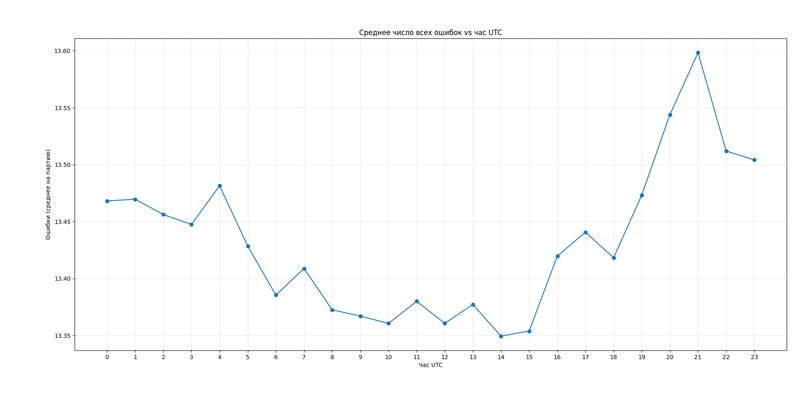
Figure 1: Distribution of all chess errors throughout the day shows a clear evening peak
1. Combined Errors: Evening "Cascade" After 19:00 UTC
The minimum average number of errors occurs between 6:00-15:00 UTC (early to mid-day in Europe and early morning in America).
A sharp increase begins around 16:00 UTC, with a peak between 20:00-22:00 UTC. During this window, the total number of mistakes per game increases by approximately 1.5% compared to the daytime minimum.
After midnight, the graph gradually declines, but only returns to the morning "reasonable" level by 4:00-5:00 UTC.
Practical Tip: Want to gain rating points against tired opponents? Look for them between 19:00 and 23:00 UTC!
2. What Specifically Increases in the Evening: Inaccuracies, Mistakes, or Blunders?
We broke down the overall score into three categories:
| Error Type | Minimum (~UTC hour) | Maximum (~UTC hour) | Amplitude |
|---|---|---|---|
| Inaccuracies | 3.75 (12:00-15:00) | 3.82 (2:00 and 21:00) | ±0.04 |
| Mistakes | 6.54 (14:00-15:00) | 6.68 (21:00) | ±0.07 |
| Blunders | 3.00 (2:00-3:00) | 3.10 (21:00) | ±0.10 |

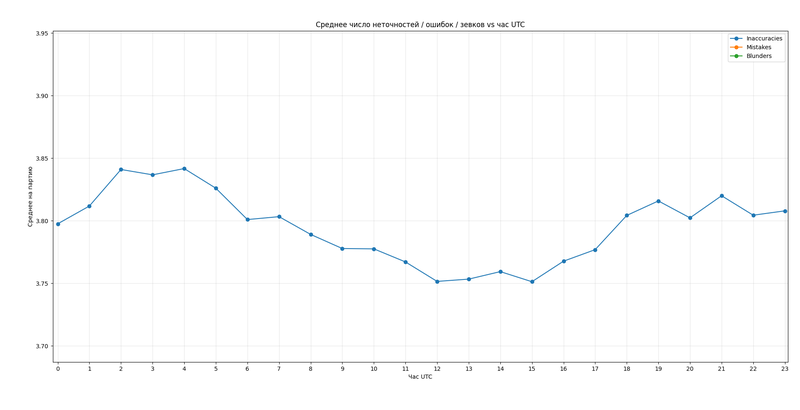
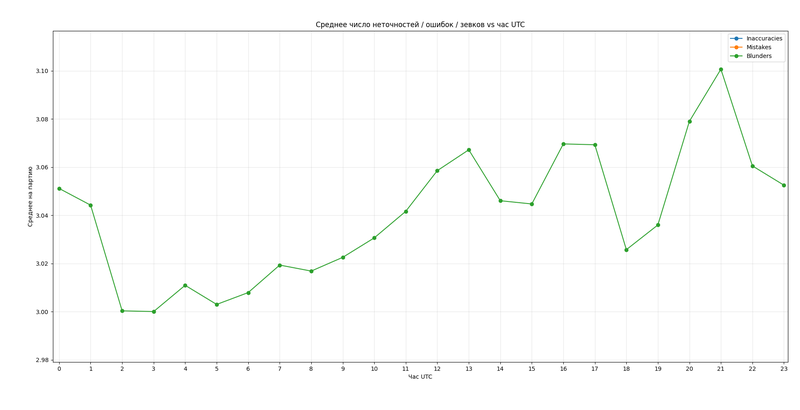
3. Time Control Matters
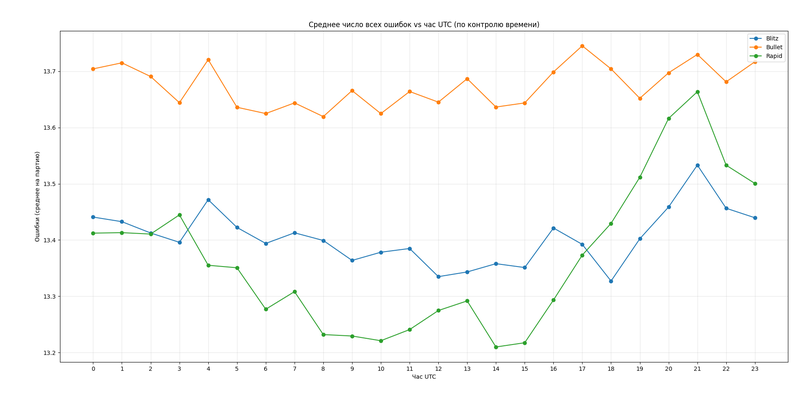
Figure 5: Different time controls show varied patterns of error rates throughout the day
Looking at the combined graph for Bullet, Blitz, and Rapid:
- Bullet (1+0, 2+1): Highest error rate overall—speed destroys quality; but the relative difference throughout the day is minimal.
- Blitz (3+0, 5+3): Follows the general curve, with peak errors in the evening.
- Rapid (10-30 min): The most accurate format during the day, but after 19:00 UTC, rapid games see the steepest increase in errors (+2%), as if concentration simply evaporates.
Why Does This Happen? Possible Explanations
Although statistics only show correlation, not causation, we can suggest several factors:
- Fatigue: 21:00 UTC is late evening or night for Europe, and evening for parts of America. Many people likely play after work, school, or other activities, having accumulated fatigue that affects concentration.
- Circadian Rhythms: Natural wake-sleep cycles influence cognitive functions. The 13:00-15:00 UTC period may coincide with peak daytime activity and concentration for many, while late evening corresponds with natural decline.
- Player Demographics: It's possible that different groups of players predominate on the server at different times of day. Perhaps more casual players who play for relaxation are online in the evening, while more focused chess players are active during the day.
How to Use This Information
If you want to increase your chances by playing against opponents who are statistically more prone to errors, then around 21:00 UTC could be your "blunder hunting hour."
However, remember:
- This is statistics, not a guarantee: Your specific opponent may be alert and fresh at any time of day.
- Your own form matters: If 21:00 UTC is the middle of the night for you and you're nodding off, the advantage might be with your opponent! Play when you feel at your best. Consider playing around 13:00-15:00 UTC if that time works for you.
- Your own play is key: The best way to win is to improve your own level of play, not just hope for opponent mistakes.
Conclusion
Lichess data shows a fascinating picture: time of day truly correlates with the number of errors in chess games. Late evening UTC (around 21:00) appears to be when player concentration decreases and the number of mistakes increases. Use this information wisely, but always remember that the key to success lies in your own preparation and attentiveness at the board.
Have you noticed similar trends in yourself or your opponents? What time of day do you play best or worst?
You may also like
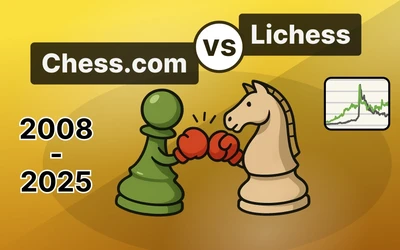 ChessMonitor_Stats
ChessMonitor_StatsWhere do Grandmasters play Chess? - Lichess vs. Chess.com
This is the first large-scale analysis of Grandmaster activity across Chess.com and Lichess from 200…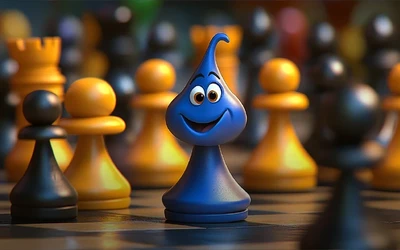 GM Avetik_ChessMood
GM Avetik_ChessMood10 Things to Give Up to Enjoy Chess Fully
Discover how embracing a lighter mindset can help you enjoy chess again and achieve better results.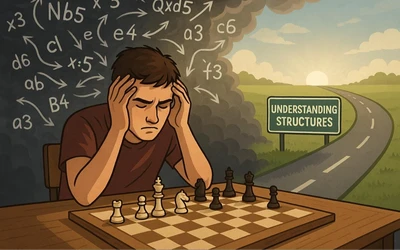 FM benkonian
FM benkonian“Are you studying openings wrong? A Coach’s Honest Take”
Openings are probably the most discussed topic in the chess community, especially at the club level.… NEXTOR001
NEXTOR001At what lichess rating in blitz/rapid can you expect to get the title
Chess titles have always been a kind of "quality mark" for a player, but how much do these prestigio… CM HGabor
CM HGabor